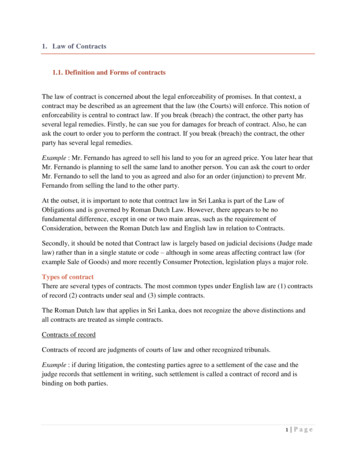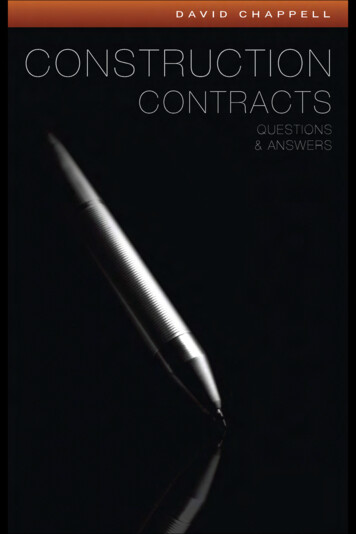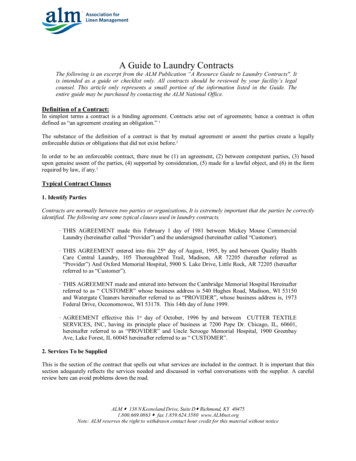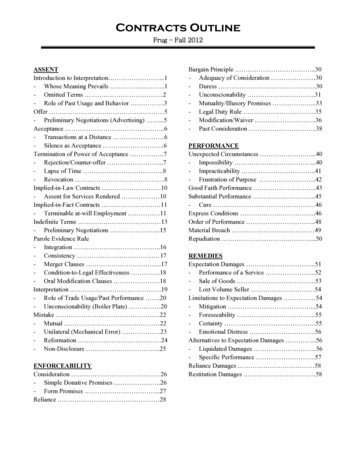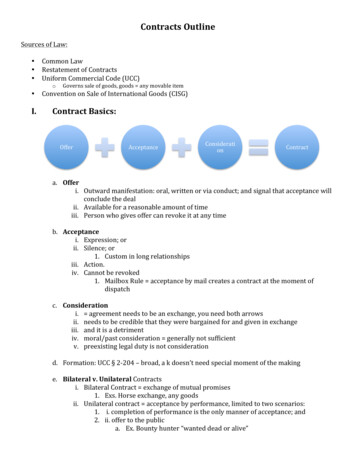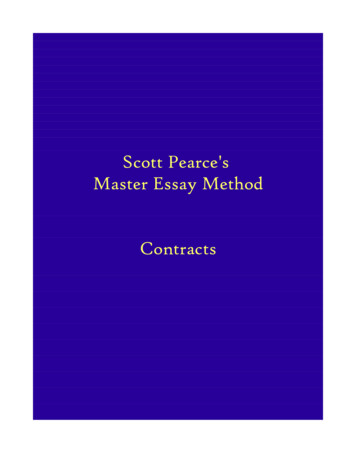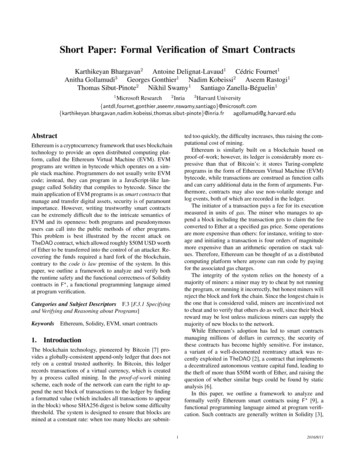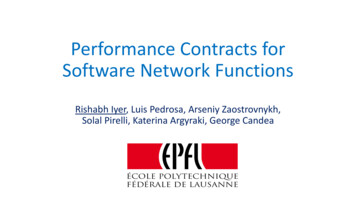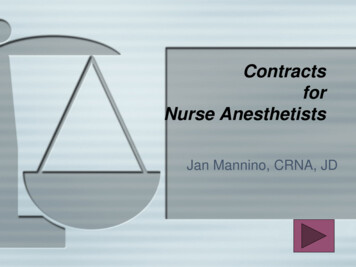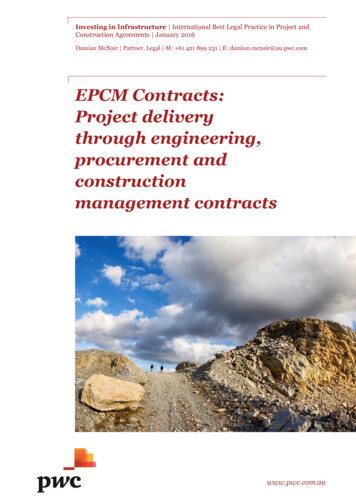
Transcription
Investing in Infrastructure International Best Legal Practice in Project andConstruction Agreements January 2016Damian McNair Partner, Legal M: 61 421 899 231 E: damian.mcnair@au.pwc.comEPCM Contracts:Project deliverythrough engineering,procurement andconstructionmanagement contractswww.pwc.com.au
EPCM Contracts: Project deliverythrough engineering,procurement and constructionmanagement contractsIntroductionThere has been a significant shift in contracting strategy within the construction market in recent years,particularly regarding traditional risk allocation. In many countries enjoying favourable economic conditions, itis no longer unusual to see Contractors refusing to bid for the usual fixed price and time contracts. This changeis partly driven by Contractors becoming more sophisticated in their risk analysis, but also largely due to: the current surge in demand in the global construction and engineering sectors the significant size, complexity and profile of so-called “mega projects” the shortage of Contractors with the experience and resources needed to deliver such mega projects the shortage of experienced labour and quality materials and resultant fluctuations in associated costs.Increasingly, Owners and Contractors are looking for alternatives to the traditional fixed price and time projectdelivery methods. While the traditional delivery methods remain (such as design and build; Engineering,Procurement and Construction (EPC); and construct only), the risk allocation and payment arrangements varysignificantly.This paper provides a brief review on the traditional fixed time and cost arrangements and, in the Engineering,Procurement and Construction Management (EPCM) context: provides an overview of the main features examines each phase of the EPCM delivery method discusses other issues, including bankability and Key Performance Indicator (KPI) arrangements.Delivery by traditional fixed time and cost arrangementsOver the past 10-15 years, project delivery methods have generally incorporated some form of fixed time andcost arrangement – whether by construct only, design and build or EPC. These delivery methods were, andremain, popular with Owners and Financiers as the fixed time and cost arrangement provides certainty and, forEPC Contracts, a single source of responsibility. Delay liquidated damages may be levied against the Contractorso as to incentivise them to complete the works on time and the circumstances where the Contractor can claimrelief for increases in the cost are carefully limited. Naturally, Contractors seek to price a risk premium intotheir remuneration to deal with such risk allocation.Where projects are delivered on a limited or non-recourse financing basis, the need for time and price certaintyis magnified. While the recent forces of demand and supply in the construction industry have also impacted therisk allocation on the “turnkey” EPC Contracts used for such projects, and bank credit committees have relaxedrequirements slightly (credit crunch aside), the change in risk allocation has been far more limited.PwC3
EPCM Contracts: Project delivery through engineering, procurement and construction management contractsOwnerLendersEPC ContractorSubcontractor ASuppliersConsultants** including designers, engineers and construction managers – where limited or non-recourse financing is inplaceOverview of EPCM arrangementsThe concept of delivering projects by way of an EPCM Contract is not new. It has wavered in popularity for anumber of decades and has, for some time, been used extensively throughout the oil, gas, petrochemical andresources industries. In the current market, sophisticated Owners are often not prepared to pay large riskpremiums and profits to Contractors under traditional fixed time and cost contracts. Add to this, the current“boom” in the number of projects to be delivered across the globe, increased pressure to fast-track delivery,limitations on Owners’ resources, rising prices of materials and labour, and we are witnessing a redefining ofthe way projects are being delivered. EPCM Contracting is just one of a number of alternative models becomingmore wide spread.Delivering an EPCM project means different things to many participants. The form and structure of an EPCMContract will vary depending on a variety of factors such as the: particular industry and project sophistication and expertise of the project parties owner’s requirements as to level of involvement owner’s internal project delivery resources/and skill set history and level of trust between the Owner and the Contractor level of integration between the project parties’ respective teams level of risk on the project (ie technical and commercial/financial).In its simplest form, an EPCM Contract is a consultancy agreement for the provision of professional or technicalservices. At one end of the spectrum, an EPCM could be considered to be a pure consultancy-type arrangementand, at the other end, an integrated EPCM Contract could look more akin to an integrated alliance stylecontract.The EPCM Contractor is typically responsible for: basic and detailed design and engineering establishing, implementing and managing tendering processes for procurement of all equipment andmaterials and awarding and managing works package contracts overall project management and administration of work package contracts, including duringwarranty periods.PwC4
EPCM Contracts: Project delivery through engineering, procurement and construction management contractsTraditionally, the Owner entered into the construction and procurement agreements for the project. However,depending on the project structure, the Owner and the industry, the EPCM Contractor may enter into contractsdirectly with Contractors and suppliers, as agent for the Owner, (with the EPCM Contractor assuming no orlimited liability under such contracts). Where this is the case, there are generally clear procedures andlimitations on the EPCM Contractor’s ability to execute such contracts.EPCM Contractors usually do not take full responsibility for: delivery of the project by certain key milestone dates care and custody of the works (with certain exceptions for arranging security and management of safety etc.) the project being delivered in accordance with the project budget.The EPCM Contractor is usually heavily incentivised to bring the project to commercial operation on time andunder budget, but is not required to indemnify the Owner for failing to do so.Depending on the scope of services to be provided by the EPCM Contractor, potential liabilities may relate towilful default, fraudulent behaviour and, after some form of negligence or recklessness, in respect ofmatters such as: performance of the design and engineering preparation of the project budget and project schedule management of procurement, including a failure to implement an objective and competitive tender process management, administration and supervision of the work packages coordination of the design and construction works between works package Contractors.Ordinarily, the maximum liability of the EPCM Contractor is much lower than is usually the case under fixedtime and cost arrangements. It is often limited to the re-performance of defective services and capped out atbetween 5-20% of the total EPCM remuneration (or, more recently, to the value of the profit and sometimes theoverhead component as well). There are generally a number of carve-outs from such a limitation, including forlosses resulting from fraud or wilful misconduct. Obviously, these arrangements depend on a number of factorsand vary widely from project to project.Model 1: EPCM Contractor has direct contractual relationship with works package Contractors and suppliers.Model 2: EPCM Contractor procures the entry by the Owner into a direct contractual relationship for the mainworks package.
EPCM Contracts: Project delivery through engineering, procurement and construction management contractsOwnerEPCM ContractorMain Works packagesSuppliersMain Works packagesSubcontractorsConsultantsOwnerEPCM ContractorMain Works packagesSuppliersOther ConsultantsMain Works packagesSubcontractorsAppendix 1 to this paper contains a table summary of some key issues for the appointment of an EPCMContractor to be considered by Owners when preparing the EPCM Contract.Typical phases of an EPCM ArrangementDesign and engineeringIt is not unusual to have the engineering arrangements split into a number of components. The EPCMContractor’s engagement may start as early as the feasibility stage of the project. That is, it may be engaged toanalyse high level technical aspects and prepare a report on the likely timing and cost, proposed procurementarrangements for long-lead items, local project considerations and other aspects of the proposed project(usually on a straight cost-plus basis).Following the feasibility study, the Contractor may be appointed to undertake the Front-End Engineering andDesign (FEED) for the project. Broadly, the FEED phase covers the basic engineering and design for the projectand also the development of preliminary project schedules, budgets and work packages. This process allows theOwner to go to the market with sufficient scope definition to ensure that it receives bids which are competitiveand realistic – ideally on a lump sum basis although this may only be for the procurement of long-lead criticalpath items (eg key equipment or foundation work/site and access preparation). As with the feasibility stage, thiscomponent usually proceeds on a cost-plus basis.Following the FEED stage, the EPCM Contractor will work the basic engineering and design into the completedetailed engineering package. In many cases, the EPCM Contractor will ultimately be responsible for ensuringthat the engineering and design will meet the relevant performance parameters for the project. To this end, itmust coordinate these works with the other parties involved to ensure that the engineering and design complieswith the overall project specification and other specific requirements.PwC6
EPCM Contracts: Project delivery through engineering, procurement and construction management contractsThe EPCM Contract may also be structured in such a way so as to permit the Owner, in its absolute discretion,to instruct the EPCM Contractor to proceed to the next stage. For example, at the conclusion of the feasibilitystage, the Owner can elect to dismiss the EPCM Contractor and engage another Contractor to undertake theFEED services regardless of whether the Contractor has properly performed the services. Also, the contract maybe structured in such a way so as to have the EPCM Contractor roll into a lump sum EPC after conclusion of theFEED services and therefore taking the turnkey risk on the entire project. This process can provide the Ownerwith greater flexibility but will obviously depend on the needs and other constraints of each particular project.ProcurementIn addition to undertaking the design and engineering for the project, the EPCM Contractor is usually requiredto procure, on behalf of the Owner, all of the materials, equipment and construction works necessary for theproper completion of the project. To this end, the EPCM Contractor is required to establish a system or followprocedures for implementing such procurement arrangements. This may be a significant task if the project isbroken down into many components and involves the EPCM Contractor preparing a suite of standard formprocurement and construction contracts for the project (most EPCM Contractors will have these already),establishing a tender process suitable for the project and works to be approved by the Owner, responding totender clarification issues, negotiating the commercial terms of all construction works packages and supplycontracts and finalising each of the agreements for execution by the Owner or approved by the Owner forexecution by the EPCM Contractor.Construction managementOnce the works have started, the EPCM Contractor assumes the role of the Owner’s “engineer” or “Employer’srepresentative” under the various work package and supply contracts. It manages and supervises each of thesecontracts. A key role for the EPCM Contractor is coordinating each of the works packages to ensure that all ofthe works interface as required and that delays and variation claims are minimised where possible. Usually theEPCM Contract will set out the limits on the EPCM Contractor’s authority. These limitations generally relate toinstructing or agreeing variations, settling of claims, waiving any breach or default and certification of finalpayments.Depending on the scope of the EPCM services which, in some cases, evolves as the project proceeds, the EPCMContractor is usually required to play an active role in monitoring and reporting during the testing andcommissioning phase of the works packages. Further, they are generally required to oversee the notificationand rectification arrangements during the defects liability period and also to deal with any other warrantyissues. In certain cases, the EPCM Contractor is required to take an active role in the management of claims ordisputes from work package Contractors. Alternatively, this role may be limited to the provision of adviceregarding any disputes that arise during the course of the projects.Other issuesBankability and completion guaranteesAs mentioned earlier, where the project is financed through limited or non-recourse project financing, Lenderswill demand a great deal of outcome certainty in terms of time and cost because their security is heavily relianton sufficient and timely revenue from the operation phase. The borrower is usually the entity newly establishedto own the project and this usually precludes the use of EPCM Contracting even though the outcome may becheaper and faster.The only circumstances (with some exceptions where there is government
arrangements for long-lead items, local project considerations and other aspects of the proposed project (usually on a straight cost-plus basis). Following the
